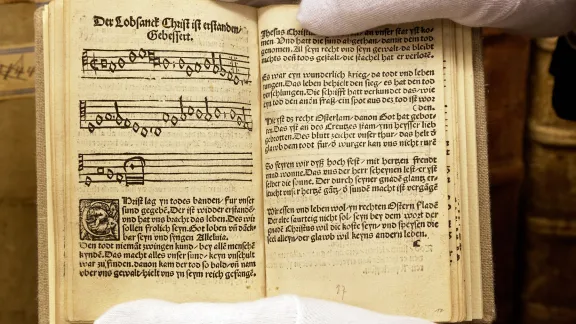The first Protestant hymnbooks were printed in Germany 500 years ago, and thousands of editions were to follow. Over time, a treasure of immense impact on faith and culture was created.

The “Erfurter Färbefaß-Enchiridion” is the oldest existing Protestant hymnal. The pages show the Easter hymn “Christ is risen”. The sheet music bears witness to the first hymns of the reformer Martin Luther. The Enchiridion was printed in Erfurt, Germany, in 1524. Photo: epd/Hans-Jörg Hörseljau
500th anniversary of the Protestant hymnal
(LWI) – The unique history of the Protestant hymnal began 500 years ago with the first printed copies. It was a fundamental expression of Protestantism and its religiousness, locally and globally. It is also a songbook that has influenced the German language, literature, and music for centuries.
The oldest existing Protestant hymnal, the “Erfurter Färbefass Enchiridion”, was published in 1524. There is only one copy of it left in the world today. It is kept in Goslar, Germany.
“With the first edition of hymnal from 1524, there was a change from listening to song to singing along in church services,” says Friedrich Kramer, Bishop of the Evangelical Church in Central Germany. From Central Germany, the idea of spreading faith through song went out into the world.
The 500th anniversary of the Protestant hymnal will be celebrated throughout Germany with an extensive program. For example, Erfurt, where the Enchiridion (ancient Greek for little handbook) was first published, will contribute a cantata service in the famous Augustinian Church on Reformation Day.
Hymns as “psalms for the people”
The first hymnbooks bear witness to the first songs of the reformer Martin Luther. Five centuries later, some of the hymns they contain, such as “Christ is risen”, an Easter hymn, are still sung in church services.
Until the Reformation, congregations did not sing sacred songs in the vernacular during church services. Nevertheless, popular “cantiones” (chants) already existed in the Middle Ages. In the Catholic mass, however, singing the Latin liturgy was reserved for the priests. That was to change fundamentally.
Luther was convinced that anyone who believed the good news of the Gospel “must not abandon it, he must sing it cheerfully and with joy, so that others may hear it and come here.” For him, singing was a spiritual way to God.
Around 1523/24, Luther wrote to Georg Spalatin, the secretary of the Saxon Elector Frederick the Wise, that he had a plan to “create German psalms for the people, following the example of the prophets, that is, spiritual songs so that the word of God would also remain among the people through song.”
Melodies were included in the hymnals from the very beginning. That also applies to the “Achtliederbuch,” published by the Nuremberg printer Jobst Gutknecht around the turn of 1523/24. That booklet contained four songs by Martin Luther, including a rewrite of Psalm 130 “Aus tiefer Not schrei ich zu dir” (Out of the depths I cry to you). Shortly afterward, the “Enchiridion” was published in Erfurt. In the same year, the “Geistliche Gesangsbüchlein” by cantor Johann Walter was published in Wittenberg with 43 hymns and a foreword by the reformer. It is considered the first choir hymnal.
The hymnal experienced its prime in the Baroque period. With hymns such as “Befiehl Du Deine Wege” (Commit whatever grieves thee) and “Geh aus mein Herz” (Go forth, my heart, and seek delight), the German theologian, Lutheran minister and hymnodist Paul Gerhardt offered comfort and hope in the face of hardship and horror during the Thirty Years’ War (1618-1648). The tradition of hymns of consolation continued with the Pietists and their Jesus songs to Dietrich Bonhoeffer’s poem “Von guten Mächten wunderbar geborgen” (By good forces), written in Gestapo custody.
A special stamp, dedicated to the 500th anniversary of the Protestant hymnal has been issued in Germany. It was presented to the public at a ceremony in the Marktkirche in Goslar on January 23.
Source: epd


